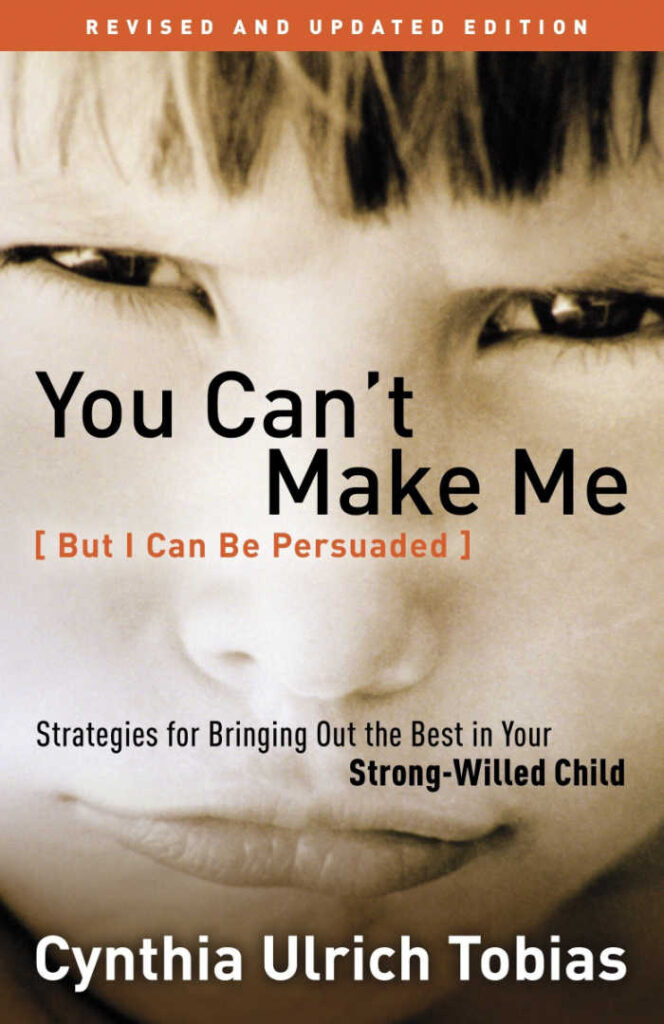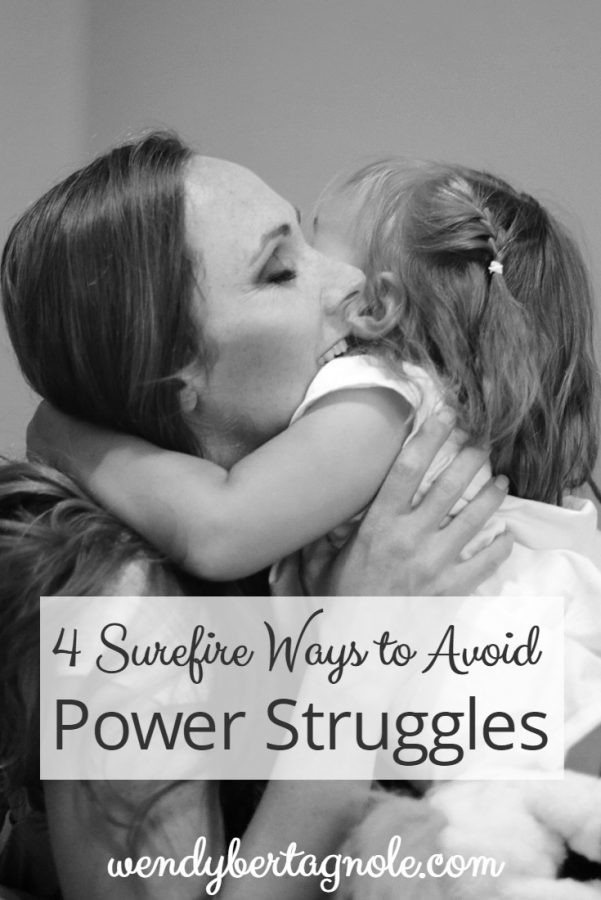4 Surefire Ways To Avoid Power Struggles
The other day I noticed a FB comment on a post of a friend.
The comment said something about “being more stubborn than your child and eventually your child will give in.”
Honestly, the thought struck a chord in my “child development” heart.
“Fight harder than your kid so he knows who is REALLY in control” is personally not a parenting technique that resonates with me and my personal value system.
I don’t know the person who wrote that comment and I am not judging her parenting style, I am simply offering an alternative to that particular perspective.
Be sure to check out even more of my helpful parenting tips, too!
This post contains affiliate links.

Cynthia Tobias, the author of You Can’t Make Me But I Can Be Persuaded suggests the way to win a power struggle is to not engage in it.
Every power struggle results in a winner and a loser, and typically getting to that point is not fun for anyone (no matter who wins).
Situations like these are not true wins, in my book, which is why I apply the following principles to try to avoid power struggles as often as possible.
4 Surefire Ways To Avoid Power Struggles

State action without using a directive
I don’t know about you, but when I feel a verbal finger is being pointed in my face, I typically tend to put up an emotional wall, or retaliate with equal verbal finger pointing.
One great way to avoid verbal finger pointing is to take out the “YOU have to…” or “YOU need to…” when talking to a child.
A sentence like “You have to put your seat belt on right now!” can be replaced with “when I hear the click of your seat belt buckle I will know you are safe and we can drive to the store.”
Same concept, different angles. Rather than pushing a child into obedience, a parent can encourage obedience.
The first way asserts authority, encourages a battle of the wills, and will result in someone losing.
The second way can result in a win for everyone without a battle of the wills.
State consequence (not punishment)
Once a parent has stated the action that needs to take place, and the child has shown disagreement with that particular thought, it is time to remind the child WHY that particular action is needed.
Examples of gently reminding a child of the consequence without engaging in a power struggle would be:
“When the living room has this many toys on the floor, people can’t walk through without stepping on toys and breaking them or hurting people. Toys that aren’t picked up in 5 minutes will go out to the garage. Would you like to set the timer or would you like me to?”
“By getting up from the dinner table you are telling me that you aren’t hungry and don’t need to eat anything else for the evening.”
“When people yell in my face it really hurts my feelings and I don’t like to listen to them. I will need to walk into another room if I continue to hear yelling.”
Patiently check for understanding
As a teacher I learned that asking a child if he understands is not a proper way to check for understanding.
Who knew?!
Have you ever given a lecture or a directive, then asked your kid “do you understand?!” to which of course he answers “yes!” but three seconds later he can’t repeat to you a word of anything you said in the first place?
I did it all the time, and when I find myself doing it with my kids I take a step back and remind myself how to REALLY check for understanding.
After stating an action then stating a rule, or a consequence, I ask my kids a few different questions (none of which involve a yes or no answer) to make sure they understand and are on the same page.
The questions I typically use are:
“So, what do you need to have on your feet before we leave the house?”
“What happens if you don’t brush your teeth before story time?”
“Tell me about kids who don’t buckle their seat belts when they are in the car.”
“Why do we NOT climb on the kitchen counters?”
These are just a few examples that would all encourage more than a one word answer, and a sound understanding of WHY rules or routines are in place.
If my child can’t answer the question I may give leading questions like’
“If you walk outside in the snow without shoes on, how would that feel?”
“Do you know why it is a law that all people in cars have to wear seat belts?”
“Done” to Avoid Power Struggles
Once a child has asserted his will and is not willing to engage in a particular activity, the consequence has been stated, and the child has a clear understanding of it, there is no need for a countdown, a warning, or any other kinds of verbal delay.
The choice has been made, the consequence is set and it’s over.
Through a webinar with Amy McCready I really came to understand this particular concept more than ever.
Honestly, once I stopped counting, the stress levels in our home decreased.
I don’t have to warn, remind, count down, and warn again.
Once the choice is made, it’s over. There’s nothing to fight about.
This approach is so great because it provides consistency and predictability for a child (which helps reduce meltdowns!).
Rather than wondering when Mom is going to issue her hollow threat, your child knows exactly when it will happen and has been part of the process of accepting it as a consequence of his own actions.
By using these four principles I have found, and been reminded that for me, it doesn’t have to be a battle of the wills every day. Battling it out is exhausting, and quite honestly, I like to save my energy for other things.
What are your experiences with these principles? I’d love to hear them!
About the Guest Author
This post originally appeared on WendyBertagnole.com and is reprinted with permission.
With an undergraduate degree in child development, and a master’s degree in special education, this foundation was a springboard for Wendy in helping kids and families to see the root of any challenges they face.
